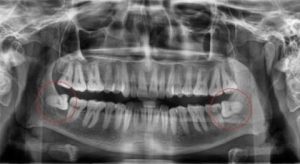WISDOM TEETH
WHAT ARE WISDOM TEETH? DO WE NEED TO REMOVE THEM?
Wisdom Teeth are located in the very back of our mouth and they are the last teeth to develop. They belong to a type of teeth called molars, which are wide and sturdy, fit for grinding food down.
While our molars erupt after we turn 6 years old, Wisdom Teeth erupt usually in the late teens or early 20’s.
There are four wisdom teeth: upper left, upper right, lower left, and lower right and they start their development at the age of 6-7 years of age when they can be seen on an x-ray. Since these teeth erupt after all the others, they may find that there is not enough room to erupt to, leading to their impaction. The reason there is not enough room for them to erupt stems from our evolution. Anthropologists believe wisdom teeth, usually called the third set of molars, were the evolutionary answer to our ancestor’s early diet of coarse, rough food – like leaves, roots, nuts and meats – which required more chewing power and resulted in excessive wear of the teeth. The modern diet consists in more processed and softer foods, causing the need for wisdom teeth to be non-existent. As a result, evolutionary biologists now classify wisdom teeth as vestigial organs, or body parts that have become functionless due to evolution.
Additionally, in our evolution the size of the our jaws has been decreasing, leaving at times not enough room for wisdom teeth to come through. The result is wisdom teeth that erupt in an angle, pushing into the gum or the tooth beside them. When a wisdom tooth is on an angle, it can’t help with chewing, which makes it useless and sometimes painful when bacteria manage to establish themselves around it and cause an abscess.
When a tooth erupts against another tooth, bone or soft tissue, it is called impaction. Impacted wisdom teeth can result in pain, damage to other teeth and other dental problems. Impacted wisdom teeth that cause pain or other dental complications are usually removed.
It is very important to check the wisdom teeth eruption development and their position at about the a ge of 15-16 years. This way we can evaluate the available space, if they are likely to cause problems and plan for the moment the teeth will be fully developed. An early assessment is key to avoid pain, discomfort or other dental complications.
ge of 15-16 years. This way we can evaluate the available space, if they are likely to cause problems and plan for the moment the teeth will be fully developed. An early assessment is key to avoid pain, discomfort or other dental complications.
In some cases, impacted wisdom teeth may cause no apparent or immediate problems. But because they’re hard to clean, they may be more vulnerable to tooth decay and gum disease than other teeth are. For that reason, Dr Kaufman may recommend removing impacted wisdom teeth that don’t cause symptoms in order to prevent future problems.
The wisdom teeth evaluation is part of our comprehensive periodical examination.
Dr Kaufman has much experience in the removal of wisdom teeth, done under local anaesthesia, nitrous oxide sedation, deep vein sedation and general anaesthesia.
In order to aid our patients during Wisdom Teeth extractions, Dr Kaufman has purchased the latest ultrasonic surgical system which is much efficient than the previously used drills. This modern system allows for the immediate removal of the wisdom teeth.
For more information about your wisdom teeth, please don’t hesitate to contact Dr Kaufman or to call Tooronga Family Dentistry